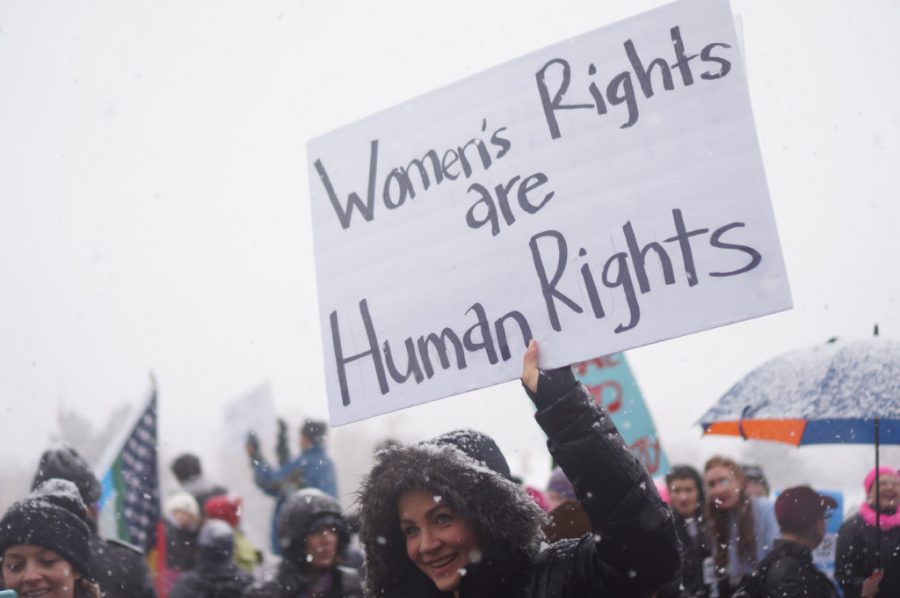Hibben: Utah is Doing All the Wrong Things for Women
A woman holds a “Women’s Rights are Human Rights” sign during Women’s March on the Utah State Capitol in Salt Lake City, Utah on Monday Jan. 23, 2017. (Photo by Rishi Deka | Daily Utah Chronicle)
April 25, 2021
A new law passed in Utah requires fathers to pay for half of pregnancy expenses, placing greater financial responsibility on men. The bill, H.B. 113, was introduced as a “pro-life” measure and is somewhat less restrictive than abortion bills proposed last legislative session. Historically, Utah has had restrictive abortion laws. A bill that would block all abortions after 18 weeks made significant headway in 2019 but has stalled since. Utah also has a trigger ban on abortions which means that if Roe v. Wade is overturned, abortions would immediately become illegal. Unfortunately, women face many barriers during pregnancy, and while alleviating the financial cost of pregnancy is helpful, it’s the reforms such as increasing sex education and healthcare access for impoverished women which Utah legislators should consider. These measures would help prevent unwanted pregnancies and protect pregnant women.
One of the most difficult aspects of being a single parent is having to worry about receiving adequate child support. Only 43.5 percent of custodial parents received the full amount of child support due. Based on growing up with a single mother, I would add that the amount required by law is not enough to cover a child’s expenses. To alleviate the financial pressure on my mother, my parents made an agreement for additional expenses to be paid whenever my mother requested them. However, not all parents are willing to make an extra contribution leaving the custodial parent with most of the financial responsibility.
On average, delivering a baby in a hospital can cost upwards of $10,000, not including medical complications. That sum doesn’t cover the cost of being pregnant for nine months, leaving low-income single mothers with serious financial difficulties. Adding additional requirements such as those proposed by H.B. 113 would require pregnant women to navigate through the costly legal system. This process could delay payments required by H.B. 113 for months, making money potentially unavailable for mothers with immediate financial needs.
This law would create a new legal connection between mothers and fathers, including abusive partners. Domestic and intimate partner violence are extremely prevalent in Utah. 1 in 3 women experience violence from a partner and 42% of adult homicides involve domestic or intimate partner abuse. During the pandemic, the number of calls related to domestic violence has significantly risen, even though these situations often go unreported. From 2006-2015, only 56 percent of all nonfatal incidents of domestic violence were reported to the police. Additionally, COVID-19 has shut down many shelters providing a safe haven and services for women — trapping victims in dangerous environments.
Oftentimes, women are forced to stay with abusive partners because of financial difficulties. H.B. 113 may inadvertently force women to make a difficult choice: remain victims of reproductive coercion or face single motherhood. Representative Brian King cast the lone dissenting vote against this bill. King stated, “I think that that’s really important that men develop a greater sensitivity to and commitment to the idea that we as males have to start perceiving and thinking about … the consequences of our sexual behavior in a way that is more sensitive to the permanent and long-lasting effects on women.” However, the concerns brought to him by domestic violence organizations in Utah were too great to ignore. “I was listening carefully to the domestic violence community … who said ‘this makes us nervous because if you have an abusive relationship we think that it could give greater allowance for and increase the likelihood that those abusers will continue to dig their claws… into vulnerable women in a way that is going to result in some real problems,’” he said.
Pro-life advocates of this bill hope that it will reduce abortions, but that’s unlikely. There were 3,082 abortions in Utah in 2018, around 4.5% of total pregnancies (including miscarriages). Only 0.3% of all national abortions are performed in Utah, but there are no statistics indicating how many women resort to unsafe procedures because they lack access to abortion services. The cost of raising a child is a significant reason for women undergoing abortion procedures, but it isn’t the only one. More women say a child interfering with their work or education is their primary reason for choosing abortion, along with relationship issues and fears of being a single mother. Without immediate support for pregnancy costs and the projected $233,610 needed to raise a child, a single mother should not be put in the position to simply wait and hope she receives payments. No amount of monetary compensation by men can equate to the physical, financial and emotional risks that women face with pregnancy and single motherhood.
If pro-life leaders want to reduce abortions, there are more effective ways to help pregnant women. Experts have argued that restrictions on abortions, like the ones in Utah, do not decrease abortion rates significantly. Worldwide, abortion rates decrease only when countries expand access to abortion services. Expanding healthcare access, reproductive services, and sex education in schools are proven methods to alleviate the difficulties and burdens that pregnant women face. In Colorado, free birth control provided to teens and low-income women reduced teen pregnancy by 40% and the rate of abortion by 42%.
Instead of promoting proven ways to reduce abortions, Utah continues to focus on women only after they are pregnant. The Utah Legislature rejected a bill this February that required consent and sexual violence definitions to be added to sex-ed because legislators feared it would promote sex. The majority of Utah legislators ignore research and statistics proving that increased sexual education reduces teen pregnancy. Instead, they continue to promote an abstinence-only sex education, which compared to comprehensive sex education, does not decrease the likelihood that teens will engage in intercourse. Utah makes it difficult for women to access reproductive services. The state expanded access to Medicaid, but it did not include family planning services and only covered abortion in cases of rape, incest, fetal impairment, health complications and endangerment of the mother’s life. Compared to the rest of the United States, Utah has received a failing grade of F- for reproductive services and rights.
Utah is focusing on the wrong solutions to help pregnant women. By restricting birth control access, limiting healthcare support, and allowing inadequate sex-ed to continue only hurts women. Ignoring the voices of women and documented research on women’s health and well-being demonstrates how little Utah’s “pro-life” leadership really cares about women. Helping women only when they are pregnant is not a pro-life measure at all.








